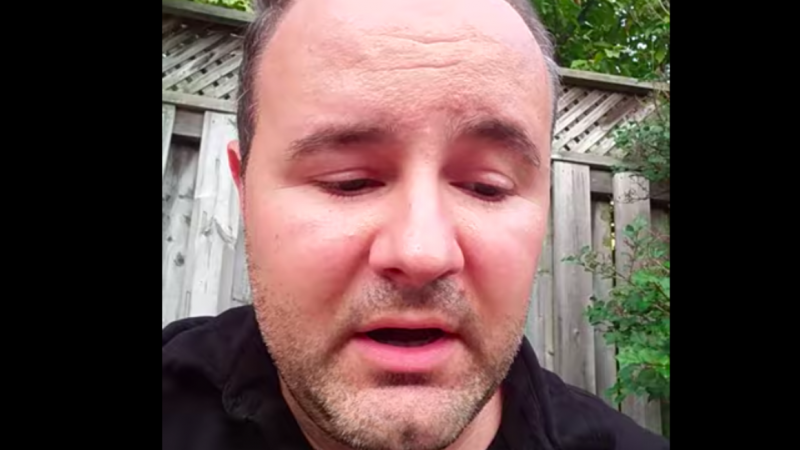Dental Hygienist Labeled 'Sexual Abuser' and Loses License for Treating His Wife
The case is a bizarre example of occupational licensing woes and backward regulations.

A dental hygienist in Canada has been stripped of his license and labeled a "sexual abuser" by an Ontario regulatory body because he engaged in sexual relations with a patient. That patient was his wife.
The College of Dental Hygienists of Ontario (CDHO) has barred Alex Tanase from the profession for at least five years, and online records will indicate that he was terminated over sexual abuse.
Tanase's case is particularly strange considering dentists are allowed to treat their spouses; it's only hygienists that are prohibited from having marital partners as patients, even when consent has clearly been established in their private sexual lives. The CDHO proposed an amendment to allow spousal treatment in April 2015, though it was never ratified by the government.
But Tanase thought it had been, according to a statement posted on Facebook. "After the CDHO proposal was submitted," he writes, "a colleague who is also a dental hygienist informed me and other coworkers that the spousal exemption had been approved when in fact it had not. I believed her without question. Unfortunately, I should have double-checked the great news but instead booked my wife for a cleaning. She suffers from dental fear and anxiety like so many other clients." He began cleaning her teeth in 2015 and continued until August 2016, when someone filed a formal complaint against him.
Under the Regulated Health Professionals Act, he was ruled a sexual abuser in April 2018. He appealed to Ontario's Divisional Court, which upheld the CDHO's decision last month. "Unless and until the Ontario government approves the regulation put forward by the College of Dental Hygienists to enact a spousal exemption," the panel wrote, "the mandatory revocation and ancillary relief imposed by the discipline committee as they pertain to spouses must be upheld." While the judges expressed regret that the CDHO proceeded with the complaint against Tanase, they said that, based on the current regulations, they had no choice but to rule against him.
The next time Tanase can reapply for a license will be in 2024. According to Ondina Love, CEO of the Canadian Dental Hygienists Association, the spousal rules exist only in Ontario and New Brunswick, which were enacted as part of a zero-tolerance policy to protect patients from exploitation. Although Tanase plans to file a second appeal, he says the estimated $35,000 fees—which will double if he loses again—are currently prohibitive, per a GoFundMe page set up to raise legal funds.
"It makes no sense, in 2019, that dental hygienists in Ontario are not allowed to clean their spouses' teeth, especially when dentists can provide dental care to their spouses," Tanase wrote in his statement. "Our spouses should have the right, just like any other client, to choose who cares for their dental health. Why are we so different from other dental hygienists in Canada? How are the dentists' spouses different from the dental hygienists' spouses?"
Tanase unwittingly hits on some of the primary concerns surrounding occupational licensing missteps. The often-extreme requirements stifle freedom of choice and are sometimes blatantly protectionist.
In the U.S., for instance, occupational licenses are commonly required in professions which most certainly don't need them. Take hair braiders, florists, and barbers, who in many states must undergo extensive—and expensive—training to get the government's stamp of approval. The result is an economy that is less dynamic, with licensing barriers preventing entry for many would-be workers.
When it comes to dental hygienists, what training should be required of them is less cut and dry. But such requirements should be created and enforced by a private professional organization of dental experts, as opposed to the government, which, in Tanase's case, has publicly labeled him a predator for sleeping with his wife. While he is not on a sex offender registry, the details of his license termination are accessible to anyone, including future employers.
"That's right: I have been labelled a sexual abuser by CDHO and the Ontario government when no actual sexual abuse existed," Tanase wrote. It's worth noting that the two are intertwined: The CDHO is governed by a council partially composed of public members put in place by the provincial government.
The U.S. is also no stranger to exacting ludicrous and long-lasting punishments for sexual "offenders." In Maryland, a teenage girl was convicted of trafficking child pornography for sending a video of herself giving oral sex; the state's highest court is currently weighing the charges. In Colorado, a 15-year-old male who swapped nude selfies with two teenage girls was forced to register as a sex offender for at least 20 years, a penalty that will drastically limit where he can live and work.
If anyone can relate, it's Tanase, who teeters on losing his home after losing both his work and reputation—all for sleeping with his wife.


Show Comments (85)